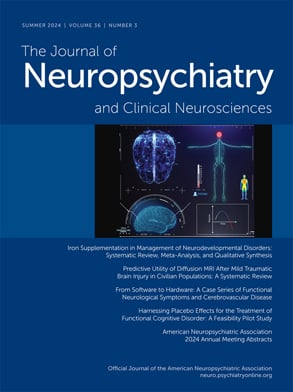SIR: The acute disseminated encephalomyelitis (ADEM) is an inflammatory, demyelinating disease that affects the CNS by immune mechanisms. It presents with a monophasic course. Its appearance is common after infectious disease or vaccination. Other cases have no previous interesting data
1,
2 and its clinical presentation is heterogeneous.
2 We present an ADEM case that began as a dissociative disorder, a type of hysterical neurosis with loss of the unitary sense of conscience. It is commonly caused by stressing factors and presents with psychical symptoms non congruent with common diseases.
3 Case Report
A 29-year-old married woman who had two children presented with the following background:
•
Cocaine inhalator (1 g per week) after 1 year
•
Past carbon monoxide intoxication with no sequalae
She was brought to the emergency room after 1 month with the following symptoms: memory impairment, difficulty performing daily activities, limited affectivity, and poor spontaneous language. The symptoms worsened with anorexia and sphincter control alteration. All of these symptoms appeared after the patient received bad family news.
Physical examination at the emergency room was normal. We ran complete blood and urine tests, thorax radiography, cranial computed tomography (CT) and cerebral spinal fluid (CSF) scans which showed no alteration. On the neurological examination, she presented language deterioration and general rigidity. A neurologist and psychiatrist concluded her admission to the psychiatric unit was due to a probable dissociative disorder, and treatment with paroxetina and diacepam was prescribed. The patient developed additional symptoms like mutism, unresponsiveness to orders, unresponsiveness to intense stimulation, and the appearance of erratic choreiform movements.
The following additional tests were performed: a new CSF analysis with negative oligoclonal bands, an electroencephalogram (EEG) with unusual brain electrogenesis and signs of cortical diffuse affection and magnetic resonance imaging (MRI) scan of the brain that showed multiple pseudonodular injuries in the periventricular and periphery white matter, mainly in the frontal and parietal lobe, T1 hypointense, and T2 hyperintense that enhanced with gadolinium. After analyzing these results, the patient was diagnosed with ADEM. A new treatment began with high doses of metilprednisolone for 5 days. Twenty days later, a new MRI was performed, showing a slight reduction of the injuries. The patient showed clinical improvement, swallowing with no difficulty, speaking spontaneously and fluently, and walking. Some months after, another MRI was performed, showing only remaining injuries without new alterations.
Comment
We show a case of ADEM with an unusual presentation, without clinical history of infection or vaccination, looking like a dissociative disorder. We treated the patient with steroids, other useful treatments, like immunoglobulines or plasmapheresis.
3 There are described cases of ADEM and other demyelinating diseases that begin with other psychiatric symptoms, such as a psychotic state.
4,
5 On the appearance of those symptoms, we remark the importance of detailed supervision, planning new studies and raising other diagnostics on those cases with an unsatisfactory evolution, appearance of new symptoms, or inappropriate answer to treatment.

